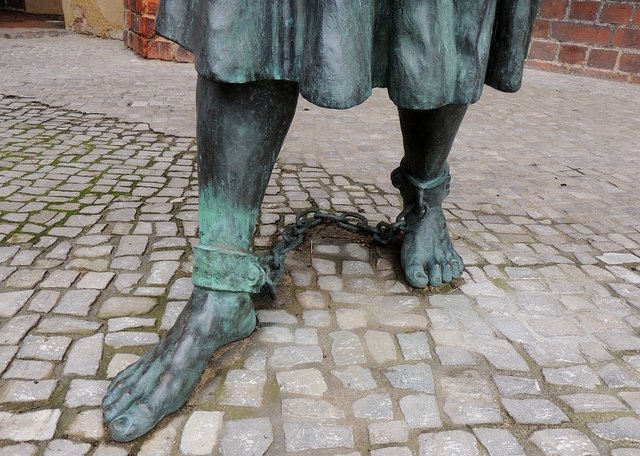Everything you need to know about the German School System
As long as you don’t actually want to use it.
I have often read about Americans that are surprised by the German school system. There certainly are a lot of things that are not that usual outside Germany.
This article is for all of you who want to have a good basic understanding of the hows and whens of the German system.
Let’s start small
In Germany, especially the Eastern part, many children at age two or three go to the “Kinderkrippe” (nursery). In the former GDR that was normal, in Western Germany with many stay at home mothers a Kinderkrippe was seen more as an “if nothing else works” thing.
Today roughly one third of eligible children visit the Krippe, as it is often shortened. How many places are really wanted by parents is a bit of a debate point. Official numbers state 39%.

The costs are 9500€ per child and year, but different studies came to the conclusion that the net economic effect (working mothers, better education) is still positive.
From age three to six children can visit the Kindergarten (yes, we Teutonic Germans still write it with t).
94% of the young children visit the Kindergarten, even though it costs the parents money and is not compulsory (as I have heard sometimes from “socialism!” cryers).
Basic Education – School
Going to school is compulsory and homeschooling is generally not allowed. If children don’t go to school, parents can be fined.
In Germany children visit the primary school (Grundschule) for four years, normally at the age of 6, sometimes 7, depending on birthday.

After that children are divided into different secondary schools, which is a point of constant bickering in Germany and bewilderment from foreigners.
The “lowest” secondary school is the “Hauptschule”, which educates another five years and people can end school with 9 years schooling, which is the compulsory minimum length.
The Hauptschule places it’s attention on preparing for a professions and less on “intellectual hights”. If you successfully finish the Hauptschule you are qualified to learn a trade in the dual education system (explanation later).
Since in Germany the states are in charge of education, there are differences especially in this type of school. Hauptschule does only exist in 6 of the 16 states.
All states have the Realschule. The Realschule’s duration is 6 instead of 5 years.

In most cases the students can set different focus points starting in class 7, depending on their strength or interests (more hours per week in math or a foreign language for example).
If you successfully finish Realschule you are also qualified for a profession-training in the dual education system.
The Gymnasium is the longest form of secondary school. Classes are going for 12 or 13 years. Please do not confuse with the big room where people jump around in funny clothing.
The German Gymnasium is made for children who expect to go to university and is the standard way to get the right to apply for university.

There are often Gymnasiums who put emphasis on certain aspects of education. There are some going for old languages (you learn Latin or old Greek). Often those are very old humanistic schools.
Others go a bit more towards the Realschule and train more practical things or have a tradition of natural science. And a few are putting more weight on arts like music.
Students of higher classes can always choose focus subjects but how many and in which combination changes from state to state and sometimes every few years. So much for a “socialist” school system where everything is the same ;)
But all Gymnasiums end with the Abitur, the certificate of education that allows you to enter university or a Fachhochschule (see Higher Education farther down).
Germany also has the “Gesamtschule” where students of all types of school learn together but get different school certificates. Here again are differences in the implementation.
There are also special schools for people with disabilities and other problems. The current trend goes towards integration of those students into normal schools.
Failed once, trapped forever?

If you read carefully you will have found that I have written “if you succeed” several times. There are unfortunately 7% of students who don’t finish school, not even Hauptschule. As a result they are theoretically limited to unskilled labor.
But failing school is not the end.
It is possible to get your school certificate later in several ways, like evening schools. You can theoretically (and some have done) start without finished school, then make your Realschule certificate at an evening school, then make an Abitur and go to university to get a doctor’s degree.
Dual Education System
A special part of the German education system is the dual education system.
In the dual system young people, after finishing Hauptschule or Realschule, are trained into a profession inside a firm, but at the same time go to “Berufsschule” (professional school).
This vocational school adds (mostly) theoretical knowledge about their individual profession to the hands-on learning they do in the company in which the students make the “(Berufs)ausbildung”.
For example, if you learn an office job you may learn accounting and 10-finger-typing in school. If you are a cook, you learn nutritional values of different foods and so on.

The dual system is often “blamed” for the highly qualified work force in Germany and the resulting high quality of products. It also seems to result in less youth unemployment.
On the downside in “you need a certificate” Germany, without finishing this Berufsausbildung you are practically guaranteed to not get work in more than unskilled labor. Your application will just be send back (if there is any reaction at all) without you having a chance to show if you got your knowledge from other ways.
Higher education
In Germany there are two types of tertiary education: university and “Fachhochschule”.
Fachhochschule is a bit of a mix of school and university. At a university you normally choose what courses to take and how you reach your Bachelor or Master yourself and you can study things that have no connection to your profession if you want to. (This was greatly reduced with the Bachelor/Master system but that is the old humanistic ideal.)
A Fachhochschule typically has those things planned for a target profession (and less courses or areas of teaching).
Basically both types of higher education can allow you to study the same subject, be it computer science or philosophy.

To be allowed to study you need a “Hochschulreife” (lit. high school maturity), which you normally show with your Abitur from the Gymnasium.
But you also reach this after learning a trade through Berufsausbildung and having at least three years work experience (mostly with additional test or requirements).
Often your marks play a big role too, since many fields of study have a restricted number of allowed students. Typical are for example teachers or doctors to prevent too much competition in those restricted fields of work, or simply because the university lacks space in their autopsy room.
This can lead to a domino effect. Students apply to half a dozen universities in hope to get into one, increasing the “Numerus Clausus” named restriction everywhere.
Or something happens in society, as it did with Japanese studies. After manga readers exploded in Germany around the year 2000, suddenly three times as many students applied to Japanese studies.
When the famous Humboldt University in Berlin enacted a Numerus Clausus on Japanese Studies, the people flocked to the smaller universities where you could study this.
As a result in just two years the membership in the beginner language class e.g. increased from 14 to 64 students, which did not rise the quality.

An important thing to point out is that school in Germany does not cost money, and that also (generally) applies to university.
Several years ago a 500€ “long study time fine” was introduced, to decrease the amount of students who took way longer then the standard study time.
But to the surprise of no one except the introducers, a current study does not show any significant reduction in long time students. They still get sick badly, get pregnant, have to work to earn money and all the other main factors for studying longer then normal.
At this point I should mention that while university does not cost money, you still have to earn money to live. There often seems to be a confusion on this point. No, you don’t get free room and food when you study.

But there is a government program called BaföG (from the short name of the law: Bundesausbildungsförderungsgesetz) which gives money to poor students.
Half of that money is in effect a subsidy, the other half a no-interest loan. Depending on how good your study results are and how fast you pay back the loan, the amount of money you have to pay back is reduced. (If you cannot pay back on time it gets interest-ing though.)
How much BaföG you get is depended on your, your partner’s and your parent’s income and wealth. The amounts to not get any help are relatively low and if your parents aren’t paying for you you have a problem.
Despite BaföG, the parent’s education still is an incredibly important factor for the question if their children study. From academic households more then 2/3 of the children study, from worker’s or unemployed families only 1/4.
This article was “inspired” by this youtube video I stumbled upon:

Informative Read! TIL alot about Deutschland's basic education system. It bewilders me how the Germany education system isn't more emulated in more countries when it clearly works.
On a side note, I first knew about the word Bundesausbildungsförderungsgesetz a few years back when i was researching about German higher education for a close friend. It's the first German compound word i've encountered. After recovering from the initial fright at the long word, i made a point to be able to pronounce it correctly. reading the word again and saying it out loud got me so satisfied as a non-german speaker.
Funnily enough this is the short name for the law, and the long name consists of several smaller words.
It will get really interesting in another 100 years, if we still have the rule that every law needs to have a name that was never used before.
Wait... You mena even that word is a short form? So like BäfoG is a short form of a short form?
Wow ich wirklich mag deutsche sprechen!
that's the long form "Bundesgesetz über individuelle Förderung der Ausbildung"
source: http://www.gesetze-im-internet.de/baf_g/
@sodom Das ist so geil! Ich habe heute etwas neue gelernt! (hope my german is correct)
Wrong! You don't need Hauptschulabschluss to start an apprenticeship.
If you find a master craftsman who employs you, you can start your apprenticeship. Even without Hauptschul diploma. Lots of my students are refugees who didn't get any school education until they came to Germany, still they got hired and started an apprenticeship.
Who told you that?
Everyone nowadays gets a job in construction, as long as you can work hard. You don't even need an application. Just call a construction company, work there for a day and as long as you are not a complete idiot, you'll get a job.
Have you ever been to a Berufsschule?
About 40% of the vocational school education is practical skills education.
In the school I teach, we have a fully equipped paint shop, a car repair shop, a butchery, a bakery, a commercial kitchen, a restaurant, hotel rooms, a carpentry shop, metalworking, a hangar with a construction site, etc.
That's why the makeover/rebuilding of the school I teach did cost about 100 million Euros.
Here you can watch, what actually happens at a Bavarian vocational school (where I teach):
That is right, but in most cases nobody will be interested in you. Not to mention 10 years back when many (outside the construction sector) wanted Abitur from their apprentices. I have even seen that for bakers...
I wrote "practically guaranteed to not get work in more than unskilled labor."
The construction you refer to is mostly unskilled labor and I also wrote that it is not 100% - as is true with every point here, since there are always differences.
Yes, I have. And in my case it was exactly 0% practical skills.
So if you take my 0% and your 40% (still more theoretical then practical) that averages 80% theoretical, which qualifies as "mostly", won't you say?
Ah, that explains it. You have a very biased view. Not all schools are like yours!
This seems to be a vocational school, which educate the theoretical and the practical part. So you can call it "schulische Berufsausbildung" and is not part of the dual system. In the dual system the practical part is trained by a company.
No. I’m a Berufsschullehrer by profession and this is how the dual system is organized,
All my students work 4 days a week and go to school one day a week and they have still 40% of their hours at school practical education.
In some federal states, like Brandenburg, the secondary school begins with the seventh class. So you are 6 years at the primary school "Grundschule".
Congratulations @lennstar! You have completed some achievement on Steemit and have been rewarded with new badge(s) :
Click on the badge to view your Board of Honor.
If you no longer want to receive notifications, reply to this comment with the word
STOPDo not miss the last post from @steemitboard!
Participate in the SteemitBoard World Cup Contest!
Collect World Cup badges and win free SBD
Support the Gold Sponsors of the contest: @good-karma and @lukestokes